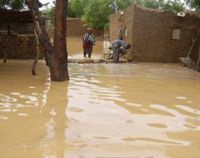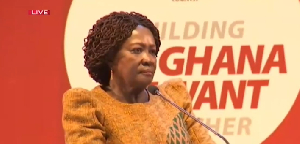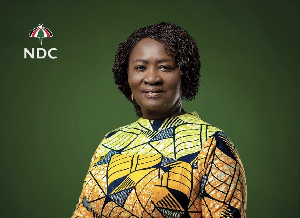
ACCRA, Ghana, 15 October 2007 – Akaappab Anyansa and her four young children are among the estimated 260,000 people affected by recent floods in Ghana. Luckily, she did not lose her two-room house, but she has been sharing her room with her neighbours since their house collapsed.
Already struggling to survive in a region where poverty and acute malnutrition is endemic, she now has to share her small stock of millet with nine people. They barely eat one meal a day.
“I boil green leaves and grass, and add salt and pepper. That is all I can give the children, but it doesn’t seem to be enough for them,” said Ms. Anyansa.
Health of women and children
“Pregnant women, lactating women and children under five are most vulnerable,” said UNICEF Ghana’s Chief of Health and Nutrition, Dr. Mark Young. “We have sent ready-to-use therapeutic food to the affected communities. We are conducting assessments and monitoring the situation closely.”In a nearby community, farmer Aveabila Aduko worries about the future of his children’s education. The floods killed his livestock – four goats and some guinea fowls. Now, the only thing left to eat is a pile of guinea corn that should last two weeks. If relief supplies don’t arrive, the father of seven is afraid he’ll have to take his children out of school.
“The rain destroyed my crops. If I am not able to farm to make money, I won’t be able to buy school books,” said Mr. Aduko.
UNICEF sends school equipment
UNICEF has sent teaching and learning material and furniture to the affected areas and together with the government is planning campaigns to encourage parents to keep children in school.“The affected flooded areas are already vulnerable in terms of education because of high levels of poverty,” said UNICEF Ghana Education Chief Peter deVries. “All the mud-structured schools are being visited to make sure that they won’t collapse.”
Although the rainy season is almost over, health officials fear that the flooding will mean an increase in malaria. Every year, malaria kills at least 20,000 children in Ghana alone.
High risk of disease
Atanga Apeya and her children are at high risk of contracting the disease. Ms. Apeya is pregnant and her children are all under five years of age. They have lost their house and are living in a shelter.
A few days ago, health worker Nora Ayaric visited the family to give Ms. Apeya an insecticide-treated bednet, the proper use of which can reduce child mortality rates by 20 per cent. In cooperation with the Ministry of Health and other partners, UNICEF supported the distribution of 28,000 nets through the end of September. An additional 20,000 insecticide-treated nets have been ordered for delivery with other relief items.
The Ministry of Health will carry out a planned nationwide Integrated Child Health Campaign in late November. During the campaign, a total of 1.5 million bednets will be distributed along with vitamin A supplements, vaccines and deworming medicine.
“The timing is good. It means that at the end of the campaign, most children and pregnant mothers will be sleeping under a treated mosquito bednet and will be protected from communicable diseases,” said Dr. Young.
- Chief Justice fulfils 1000 bags of cement promise to support the construction of new homes for flood victims
- Flood kills 18-month-old baby at Nkafoa
- We need active collaboration to curb perennial flooding - Asenso-Boakye
- Ghana partners World Bank to tackle Accra floods
- June 3 flood disaster: Don’t forget the victims - Herbet Mensah to Ghanaians
- Read all related articles












